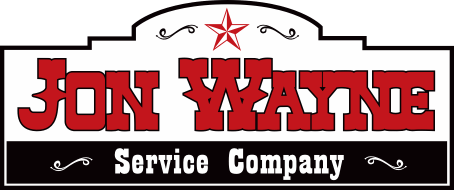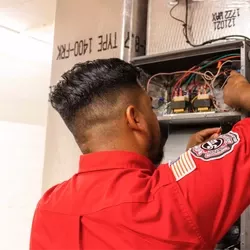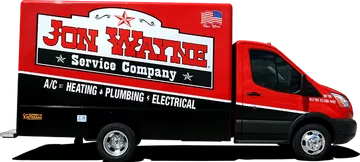How Much Does a Heat Pump Installation Cost in San Antonio?
When homeowners consider installing a heat pump in San Antonio, everyone asks, "How much will a new heat pump cost?"
Installing a new heat pump in San Antonio will cost anywhere from $4,000 to $12,000, with the average being $6,595.
What causes such a wide price range?
Generally, the price variation on a heat pump installation comes down to five factors:
- The efficiency of the system
- The comfort features added
- Possible ductwork modifications needed
- Then size of the system
- The company you select
We'll go over each of these factors to help you better understand the costs associated with installing a new heat pump.
Keep in mind, you won't know how much a heat pump system will cost you until you have an accurate estimate based on your home's specific needs. So, if you'd like an estimate instead, call us at 210-293-5550 to schedule a free in-home quote!
Cost factor #1: The energy efficiency
An energy-efficient heat pump will cost more upfront, but it will also save you more in energy bills over the long run.
Because heat pumps work to both heat and cool your home, they have two different energy efficiency ratings:
- SEER rating (Seasonal Energy Efficiency Ratio) tells you how efficiently the heat pump cools your home; ratings range from 13 to 20+.
- HSPF rating (Heating Season Performance Factor) tells you how efficiently the heat pump heats your home; ratings range from 7.7 to 10+.
The higher the rating for both the SEER and the HSPF, the more efficient the heat pump will be in heating and cooling your home.
In warmer, humid climates like San Antonio’s, you should consider buying a heat pump with ratings of at least 15 SEER and 8.2 HSPF but, as we said, these ratings are dependent on many factors, so a qualified HVAC technician can make accurate recommendations for your region’s and home's needs.
Cost factor #2: The comfort features added
The price of a heat pump installation also depends on the number of "comfort features" you choose to add to the heat pump system.
Some common comfort features include:
- Smart thermostats that adjust your home's temperature automatically; this helps lower energy bills and extends your heat pump's life.
- Variable-speed blower motors that will increase and decrease your air conditioner's speed automatically to match your home's heating and cooling needs, increasing comfort and saving money.
- Air purifiers that improve air quality by reducing airborne pollutants, germs, bacteria, pet dander, and chemical odors.
Cost factor #3: Possible ductwork modifications needed
In most cases, it's possible to use the home's existing ductwork with a new heat pump system, which helps keep costs down. However, a few situations may require ductwork modifications, cleaning, or sealing, which will raise the cost of the project.
Situations that might require additional ductwork costs include:
- Ductwork that's old or leaks air is improperly sized, or not insulated well should be addressed before installing a new heat pump.
- Excessively dirty ductwork should be cleaned after the installation.
- Poorly designed or installed ductwork may need to be replaced.
Cost factor #4: The size
Heat pumps are sized by their heating and cooling capacity, which is measured in tonnage. The greater the tonnage of the heat pump, the more most* companies will charge.
Tonnage refers to the amount of heat the heat pump can remove from the home in one hour. Residential heat pumps are usually sized between 1.5 and 5 tons.
It’s important to install a heat pump with the correct tonnage. When it comes to what size heat pump you need, bigger isn't always better. If the system is too large (more tonnage than the home needs), it will cool/heat a home too quickly, then shut off over and over again.
But if the heat pump system is too small, the heat pump will run continuously and struggle to cool/heat your home properly.
Both oversized and undersized heat pump units will result in:
- Inefficient cooling/heating
- High energy bills
- A shortened heat pump lifespan
To correctly calculate your home's heating and cooling needs, an expert technicianmust complete an evaluation called a "Manual J Heat Load Calculation."
During this load calculation, a professional will determine the size heat pump your home needs based on:
- The climate in your part of the country
- The square footage
- The quality of the ductwork (is there leakage?)
- The height of the ceilings
- The type of flooring (carpet vs. wood)
- The kind and amount of insulation
- The number of rooms
- The number of windows
- And other things…
*At Jon Wayne, we do not charge by size. We want to ensure that every homeowner gets the right size heat pump for their home, regardless of the size.
Cost factor #5: The company you select
Typically, the more experienced and reputable the company you select, the more they will charge. But what matters most to a successful heat pump installation is finding a trustworthy company. So while this will affect your bottom line, the added cost is worth it. An experienced company will guarantee a high-quality installation that will extend the life of your heat pump and ensure that it runs more efficiently.
Some questions you should ask a heat pump contractor include:
- Can you provide local references?
- Do you offer a labor warranty?
- Do you offer a service plan?
- Are you properly licensed and insured?
- Do you follow industry standards?
- Do you have good reviews?
At Jon Wayne the answer to all these questions is - Yes! Plus, we have a Google Rating of 4.8 out of 5 stars in 6,797 reviews.
Need a heat pump installation estimate? Call Jon Wayne!
Thanks to the mild winters and hot summers in San Antonio, a heat pump is ideal for heating and cooling your home in this part of Texas. For 100% satisfaction guaranteed heat pump installations, call Jon Wayne Service Company and schedule your in-home estimate today!
*All prices shown are estimates and can vary depending on a variety of factors. For an accurate price for your project, call (210) 239-2892.


